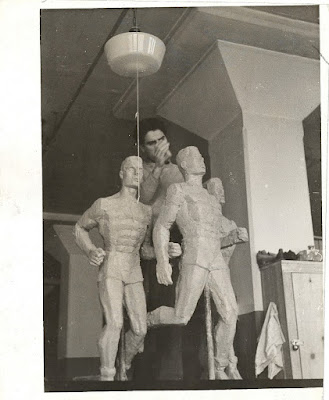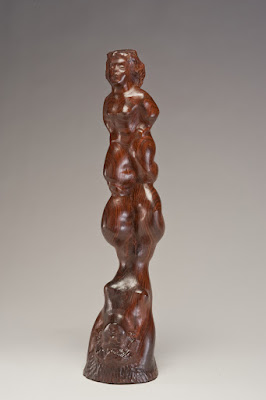-1930-woodcut-Hirshhorn-Museum-Washington-DC.jpg) |
| Chaim Gross Untitled (Circus Scene) 1930 woodcut Hirshhorn Museum, Washington DC |
-Art-Institue-of-Chicago.jpg) |
| Chaim Gross Untitled (study for sculpture) 1934 drawing Art Institue of Chicago |
-Hirshhorn-Museum-Washington-DC.jpg) |
| Chaim Gross Bird's Nest (study for sculpture) 1934-35 drawing Hirshhorn Museum, Washington DC |
 |
| Anonymous Photographer Chaim Gross carving in Ebony 1935 gelatin silver print Archives of American Art, Washington DC |
-Smithsonian-American-Art-Museum-Washington-DC.jpg) |
| Chaim Gross Welders 2 (study for relief-panel, WPA project) 1936 drawing Smithsonian American Art Museum, Washington DC |
-c1938-gelatin-silver-print-Archives-of-American-Art-Washington-DC.jpg) |
| Peter Juley Chaim Gross working on Harvest (WPA project for New York World's Fair) ca. 1938 gelatin silver print Archives of American Art, Washington DC |
 |
| Chaim Gross Tumblers 1942 ebony Art Institute of Chicago |
 |
| Milton Avery Chaim Gross ca. 1943 oil on board National Portrait Gallery, Washington DC |
 |
| Harry Sternberg Chaim Gross 1943 screenprint Hirshhorn Museum, Washington DC |
 |
| Chaim Gross Homage to Henry Moore 1944 wood Hirshhorn Museum, Washington DC |
 |
| Anonymous Photographer Chaim Gross working in the Studio ca. 1950 gelatin silver print Archives of American Art, Washington DC |
 |
| Chaim Gross Sunday Fishermen 1951 watercolor and ink on paper Smithsonian American Art Museum, Washington DC |
 |
| Chaim Gross Acrobats Balancing 1951 wood Hirshhorn Museum, Washington DC |
-Smithsonian-American-Art-Museum-Washington-DC.jpg) |
| Chaim Gross Reflection (study for sculpture) ca. 1954 watercolor and crayon on paper Smithsonian American Art Museum, Washington DC |
 |
| Chaim Gross Reflection 1954 bronze on stone base Smithsonian American Art Museum, Washington DC |
 |
| Chaim Gross Judith 1960 rosewood Smithsonian American Art Museum, Washington DC |
 |
| Chaim Gross Untitled 1976 watercolor and graphite on paper Smithsonian American Art Museum, Washington DC |
from Epistle: To Elizabeth, Countess of Rutland
Beautie, I know, is good, and bloud is more;
Riches thought most: But, Madame, thinke what store
The world hath scene, which all these had in trust,
And now lye lost in their forgotten dust.
It is the Muse, alone, can raise to heaven,
And, at her strong armes end, hold up, and even,
The soules, shee loves. Those other glorious notes,
Inscrib'd in touch or marble, or the cotes
Painted, or carv'd upon our great-mens tombs,
Or in their windowes; doe but prove the wombs,
That bred them, graves: when they were borne, they di'd,
That had no Muse to make their fame abide.
How many equall with the Argive Queene,
Have beautie knowne, yet none so famous scene?
Achilles was not first, that valiant was,
Or, in an armies head, that lockt in brasse,
Gave killing strokes. There were brave men, before
Ajax, or Idomen, or all the store,
That Homer brought to Troy; yet none so live:
Because they lack'd the sacred pen, could give
Like life unto 'hem. Who heav'd Hercules
Unto the starres? or the Tyndarides?
Who placed Jasons Argo in the skie?
Or set bright Ariadnes crown on high?
Who made a lampe of Berenices hayre?
Or lifted Cassiopea in her chayre?
But onely Poets, rapt with rage divine?
And such, or my hopes faile, shall make you shine.
– Horace (65-8 BC), translated by Ben Jonson (1600)